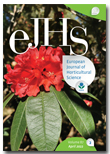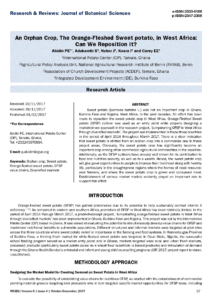Optimization of plant regeneration protocol is a first critical step to facilitate techniques such as transgenesis, cisgenesis and genome editing. In this study, we assessed: i) influence of explant type on regeneration efficiency (RE); ii) RE of 33 sub-Saharan African sweetpotato cultivars; and iii) levels of endogenous zeatin riboside (ZR), indole-3-acetic acid (IAA) and their correlation to RE. Indirect organogenesis was conducted using a 2-step protocol: step-1, explants were cultured on MS containing 0.05 mg L-1 2,4-D for 2 days and transferred to step-2 with MS with 0.2 mg L-1 cytokinin for 60 days. Highest RE was obtained from leaf with petiole explants. High RE of 60–87% was obtained for 3 cultivars, moderate RE >40% for 7 cultivars and low RE <10% for 17 cultivars. Results indicated that exogenous plant growth regulators (PGRs) influenced RE, with kinetin and ZR inducing higher RE than thidiazuron (TDZ), though this was genotype dependent. Of the 6 cultivars screened for endogenous PGRs, the Tanzanian cultivar ‘Carrot’, which had with lowest RE, had the highest IAA:ZR ratio. Correlation between endogenous IAA and RE was strongly negative while weakly positive for ZR, which suggests that endogenous PGRs make a minor contribution to RE. In conclusion, 21% of cultivars with RE >40% were amenable to the 2-step protocol on application of exogenous PGRs; endogenous IAA and ZR levels are genotype-dependent, and higher endogenous IAA levels may contribute to inhibiting regeneration. For the remaining recalcitrant cultivars, we recommend further optimization, paying particular attention to endogenous PGRs that could have synergistic and antagonistic interactions with exogenous PGRs.
Exogenous and endogenous plant growth regulators’ effect on regeneration of selected African sweetpotato (Ipomoea batatas L. Lam) cultivars
Citation: Wamalwa, L.; Tovar, J.; Indieka, S.; Torto, B.; Ghislain, M. 2022. Exogenous and endogenous plant growth regulators’ effect on regeneration of selected African sweetpotato (Ipomoea batatas L. Lam) cultivars. European Journal of Horticultural Science. ISSN 1611-4434. 87(2). 1-10.
2022-11-06
GENETIC RESOURCES, GENETICS, GENOMICS AND CROP IMPROVEMENT SCIENCES GGCI, SWEETPOTATO AGRI-FOOD SYSTEMS, SWEETPOTATOES
journal_article



